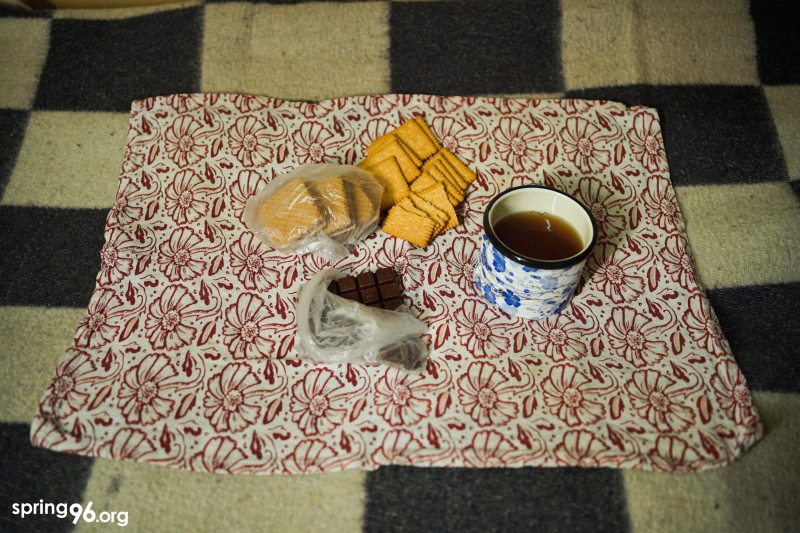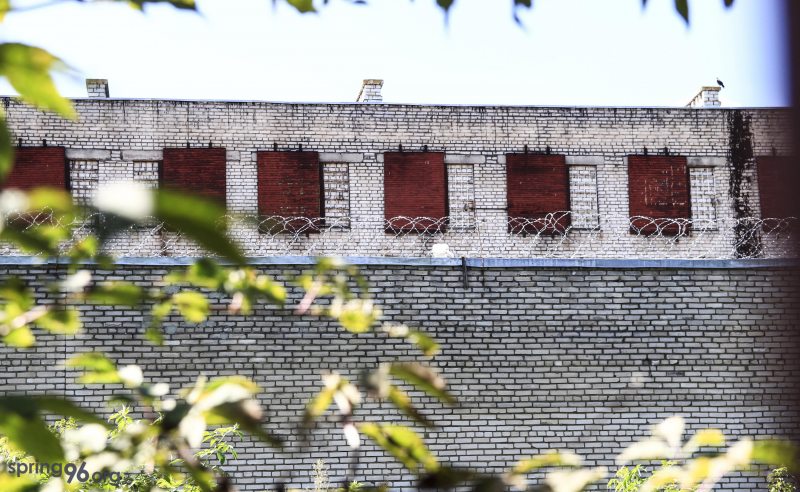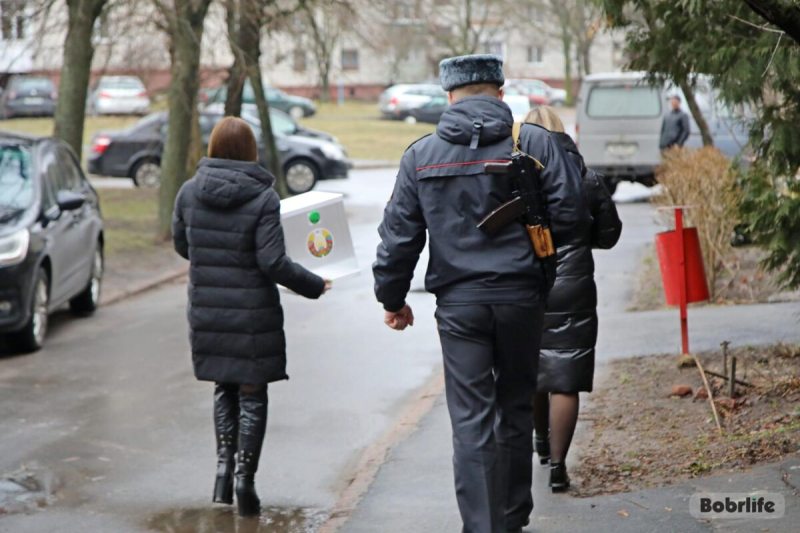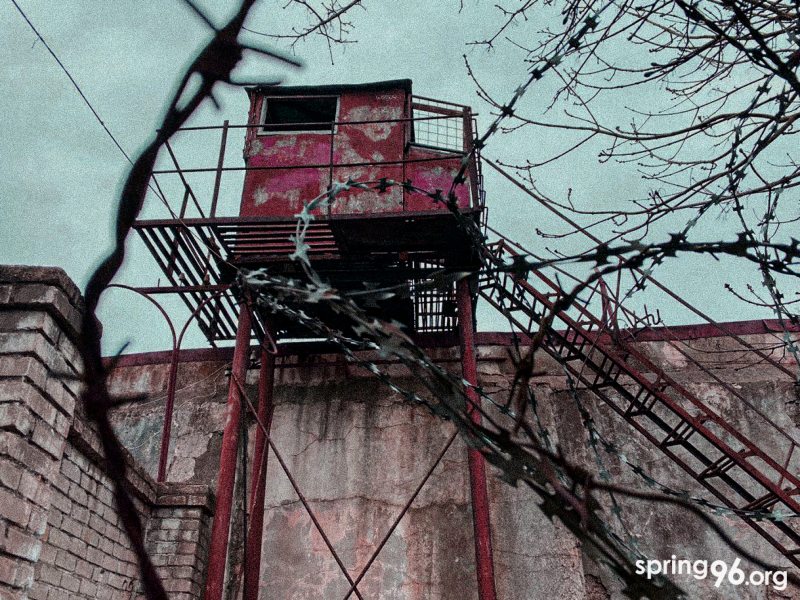"They are trying to do everything to wipe the smile off your face forever"
Minsk resident Alina (name changed for security reasons) graduated from university, worked in Belarus and wanted to move to Poland, but she was not released from the country at the Belarusian border. The customs officers informed the woman that she was prohibited from leaving, they took her off the bus and told her to deal with the reasons for the restriction in Minsk on her own. It turned out that a criminal case had been opened against Alina for participating in post-election protests under Article 342 of the Criminal Code. For this, she spent almost two months in prison and in April of this year was sentenced to home confinement. The former political prisoner, who nevertheless got to Poland a few months later, told Viasna about the naked search, taking showers using a pads package, voting in the elections in Žodzina prison, taking care of herself, and the move from Valadarka to Kaliadzičy.

"If they haven't detained me at the border right away, then it's nothing serious"
In mid-February 2024, Alina planned to move from Belarus to Poland, but the woman was not let out at the Belarusian border: she was told that she had been banned from leaving the country and should contact the Citizenship and Migration department in Minsk.
On Monday morning, Alina and her parents went to the Citizenship and Migration department to find out the reasons for the ban.
"I went there myself because I thought that if they haven't detained me at the border right away, but let me go, then it's nothing serious. In the department, an employee took my passport, went somewhere for a couple of minutes and returned with some paper. She informed me that a criminal case had been initiated against me. And she added: "Don't lie, you know why." The woman said that it was in our best interests to go to the investigator on our own."
Alina and her parents immediately went to the Investigative Committee. They really hoped that due to the fact that she came herself, it would be just an interrogation.
"The investigator was already waiting for me with the doors open. She asked me right away: "Where were you?" I didn't understand: what does it mean, where was I? But she meant 2020. In front of me, she opened a large folder with a criminal case, where she showed me a sharp photo of me at a protest. It was a screenshot from a video that they got from another person. Now the protesters are searched with the help of photos and videos found on the devices of other detainees."
"During the interrogation, one of the employees leaned towards me, whispered obscenities, and told me to stop lying"
As it turned out, the criminal case against Alina was initiated back in December 2023, but she was detained only in mid-February.
"That's how the investigators work now with participation in protests: they detain a person just before the case is completed. They collect the evidence themselves, and when the time comes to complete the case, they detain the person, take them for interrogation, place them in custody for a couple of weeks and after the trial they release them to home confinement. This was the case for me and for other girls I met in prison.
I realized that they are doing this because the prisons are really overcrowded right now."
While Alina was waiting for several hours for interrogation in the investigative room, Main Directorate for Combating Organized Crime and Corruption (GUBOPiK) employees arrived at the Investigative Committee.
"During the interrogation by the investigator, one of the employees leaned towards me, whispered obscenities, and told me to stop lying; "we will talk differently to you". He was hinting at physical abuse. It was all disgusting. After the interrogation, the investigator told me that her hatred for me was growing."
"14 women took turns collecting water in a pads package to wash themselves"
The woman was placed in the temporary detention facility at Akrescina, but instead of the legal 10 days before being sent to a pre-trial detention center, she was kept there for 12 days.
"The most pressing issue in prison is hygiene. For me, as a person who takes a shower every day, not washing myself for two weeks is too much. The only good thing was that there were plastic bottles from other people. We poured water in them and washed ourselves. But during one of the inspections under the supervision of the chief, all the bottles were taken away. And there are 14 women in a double cell! Somehow we got a pads package. And 14 women took turns collecting water in a pads package to wash themselves.
The naked search was also humiliating. Relatives could not send us the pads, and a nurse rarely gave them, or just cursed at us. I ran out of pads during my period. And at that time I was taken for an inspection. I took off my dirty underwear during the inspection, and it was so uncomfortable and unpleasant for me... It was so humiliating. And I couldn't influence what was happening: I couldn't change my underwear due to the lack of care packages, I couldn't do anything with my body, they didn't give me pads and other hygiene products. I'm not even sure that the men were not present during this naked search, since the doors were open."
"My story is not that scary"
The woman spent almost two weeks in February in three cells of the temporary detention facility.
"We were moved from cell to cell to create psychological discomfort and pressure. When the employees saw through the video cameras that the girls and I started chatting and smiling, they put us to different cells. And how else is one to survive: to sit and cry all the time? They are trying to do everything to wipe the smile off your face forever."
Investigators came to Alina only on the ninth day. All this time she was in the dark about her status and criminal case.
"But my story is not that scary. Many girls told how their flats were broken into in the middle of the night, their apartments vandalized, their children woken up and traumatized for life...".
The woman recalls that most of her cellmates were detained for political reasons.
"It was terrible. We had women with us who were 60 years old. Women with very serious illnesses. I remember my cellmate, a woman with a brain aneurysm. It is impossible to get medical care there. The best you could get was a pill from a nurse if she was afraid that a person might die. But it was accompanied by harsh obscenities.
The scariest thing is that almost all the cellmates were political prisoners. It shouldn't be like this in a normal world."
"Employees rejoice at prisoners who are not political and consider them "normal prisoners"

From the temporary detention facility at Akrescina, the political prisoner was transferred to Žodzina prison, where she changed two cells in a month and a half.
"For about a week I was in a new cell after a renovation. It was very hard to breathe there; some of the girls felt sick. The renovation had just finished, so there was still the smell of paint in the cell. The renovation was very bad. The radiator started leaking on the first day. They put surveillance cameras over washbasins. And we had to wash somehow, so we had to do everything naked in front of those cameras. And when you realize that men are looking at your bare breasts, it's very unpleasant, to put it mildly."
Alina says that, like at Akrescina, most of her cellmates were detained on political charges.
"Employees rejoice at prisoners who are not political and consider them "normal prisoners". I remember when I was registered at Žodzina prison, and I named my article, and they began: "Where did you go? What were you doing there? You are extremists..." Three more women from Akrescina came with me, one of whom was imprisoned for "theft." And the employees were so happy about her! They said she would be in charge of the cell."
"Employees often played a guessing game with us"
Alina says that, in general, there were no problems with letters and care packages from relatives, but recalls that letters from her cellmates to their relatives in Belarusian on Mother Language Day did not reach them:
"They bought such beautiful envelopes, but they were not sent. But at least the letters in the Belarusian language were accepted.
As for the parcels, the staff often played a guessing game with us: they said the last name of a prisoner and asked who the parcel came from. It was necessary to guess who sent it. If the prisoner didn't guess, they gave it anyway after a lot of guessing. If you gave the name of the person who sent the package, they could ask the address."
"Some were asked to show their completed ballot"

Alina told how the elections* took place in Žodzina prison:
"A large laminated campaign poster with candidates was hung in the cell. They brought me to prison on the 23rd and I didn't have time to recover.
I remember the day before the election, employees came to our cell to check our knowledge, so to speak: they asked us what event we were going to tomorrow, who we would vote for, asked us not to be stupid, because, as I understand it, they were also supervised. They also asked us to put on makeup in advance. We laughed a lot about it.
On Sunday morning, February 25th, we were lined up in two rows. Each of us was assigned a number. We were instructed that they would take us to the booths now and if our number was called, then we needed to go into the office, say hello, take the ballot, leave the office, make our choice in the booth, return to the office and throw the ballot into the box. In general, everything was clear. When we were brought to the office, we were all placed facing the wall with our hands behind our backs: this is a standard procedure for moving around the prison. So we stood and waited, each with her own number.
There were three people sitting at the desk in the office: the commission. Of course, there were no observers there. Their role was played by the guards. The voting booth was in the hallway, and it was a steel frame with red curtains. Everything went smoothly for me, and some girls were asked to show a completed ballot to check if they spoiled it.
Riot police officers in helmets and with dogs were standing in the hallway near the booths. All the cells voted, one after the other. As far as I understand, there were booths on each floor. There were a lot of prisoners, and everyone had to vote."
"The main thing was to save your health"
The woman notes that it was difficult to take care of oneself behind bars, but there are many life hacks in prison.
"You're surprised how many different ways of using the most ordinary objects there are. The girls made face masks from oatmeal, and a scrub from brewed coffee.
I have thick eyebrows and they were very overgrown in custody. Girls in prison usually pluck them out with a thread, and I was scared to do so because you can accidentally catch the wrong hair. Then I got used to plucking my eyebrows with nail clippers. We had almost a salon in our cell: I sat and plucked the eyebrows of some girls.
We had a very small mirror in which we looked at ourselves in dim light. A pimple on your nose or dry hair was absolutely unimportant. The main thing was to save your health.
There was a girl with us who was prescribed a diet [prescribed for patients with HIV or tuberculosis], and she was given dairy products that she did not drink or eat. So her cellmates got at least a spoonful of cottage cheese so that their teeth would not fall out. We sometimes used milk for face masks. Sometimes, when employees came for a check, they were met in the cell by girls with brown and white faces, with masks."
"It was unclear what can be considered an "escape attempt"

- Illustrative photo by spring96.org
Before the trial, the girl was transferred to the pre-trial detention center No. 1 on Valadarskaha in Minsk. Alina remembers it with horror.
"We were brought to the train in a detainee truck. This is not at some kind of station, but in an open field. The employees hurried us, so we almost had to run out of the detainee truck. During the instruction, I heard them saying: "If you try to escape or disobey, we will shoot to kill." It was scary. It was unclear what they might consider an "escape attempt." And if I got lost and went the wrong way? They took us to the train in a line, and there they called us by our last name and we needed to jump into the car very quickly with our bags. I almost fell over there. But then it was nice to go in the train: I watched the lights through the bars on the window."
"Everyone is waiting to move"
Alina says that pre-trial detention center No. 1 is getting ready to move to a new building in Kaliadzičy: in early April, the library was moved.
"I didn't see people getting transferred, but everything else was. The library was. I binge-read many books. But at one point a librarian arrived and asked for all books in foreign languages to be returned. So I managed to read only 50 pages of Harry Potter in English.
There was a lot of talk about moving. Everyone was waiting for it. The guards were proud that there will be a "European prison" in Kaliadzičy. But we have seen enough of these European renovations in Žodzina prison..."
"I didn't feel safe. I was just waiting for GUBOPiK to come to me."
Following the results of the trial, Alina was sentenced to home confinement and released in the courtroom. This time she managed to leave Belarus. The woman is safe now.
"After the detention, I had been in a very bad condition before leaving. I understood that I was convicted only for one protest, but there were other cases that have not been found... And I'm already in the field of view of the security forces, and they can dig deeper. I didn't feel safe. I was just waiting for GUBOPiK to come to me. I was afraid to leave my apartment and to stay there. I was afraid that they would come to me, but I also thought that they would detain me on the street and no one would know where I was, because I did not take my phone with me so that I would not be tracked."

















